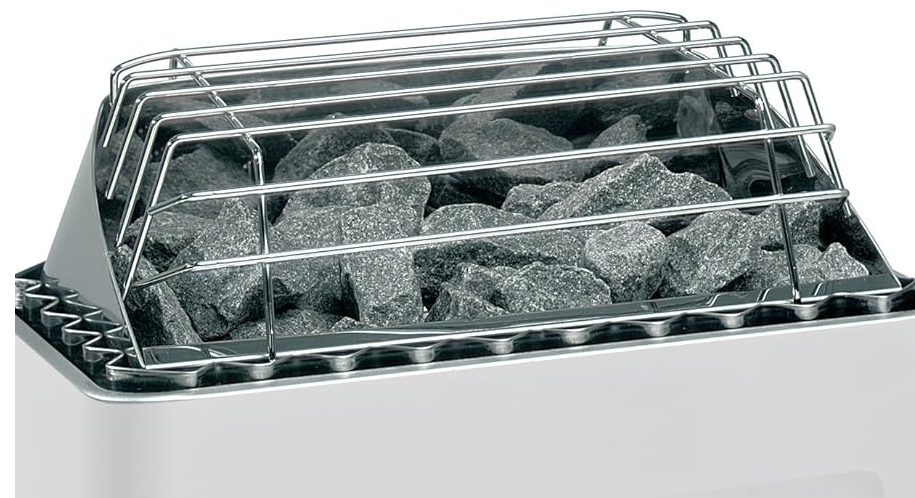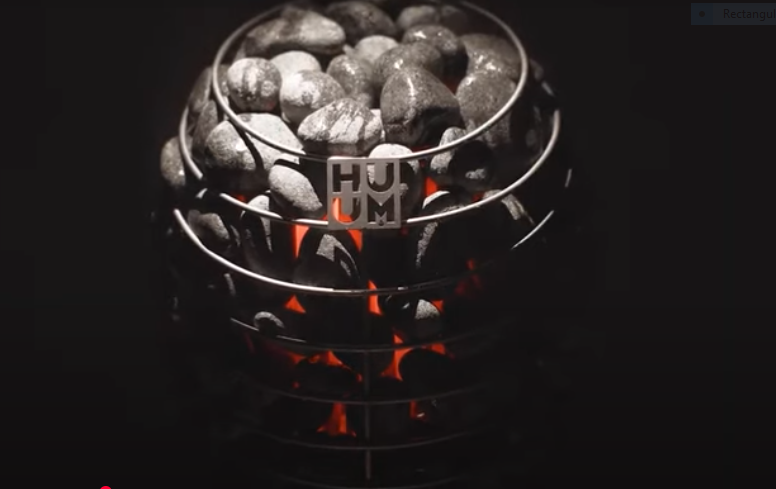Harvia Sauna Heater Reviews: Pros and Cons
Disclosure: As an Amazon Associate, I earn from qualifying purchases. Learn more
Harvia sauna heaters are known for their durability and efficient performance. The Harvia KIP 8KW model is a popular choice, featuring stainless steel construction, built-in controls, and included sauna stones. Pros include powerful heating for medium-sized saunas, low outer casing temperature for safety, and residential-friendly operation. Some cons may involve the need for professional electrical setup, requiring additional arrangements for placement.
Reviews highlight reliable heat distribution and long-lasting build quality. Users appreciate the larger stone capacity for steady steam production. While installation may require expertise, the heater’s performance makes it a strong option for home saunas. Proper maintenance ensures consistent functionality over time.
Harvia KIP 8KW Sauna Heater Review
Capacity
- Heats 247–424 cu. ft.
Key Features
- 8KW power output
- Built-in controls
- 45 lbs sauna stones included
- Stainless steel construction
- 33.3 AMPS rating
- Low outer casing temperature
Specialty
- Optimal heat release
- Residential sauna use
- Larger stone space
Compatible For
- Home saunas
- Small to medium-sized sauna rooms

Reviews
The Harvia KIP 8KW heater is ideal for residential saunas, offering efficient heating and built-in controls. Its stainless steel build and large stone capacity ensure long-lasting performance.
How Harvia Sauna Heaters Function
Harvia sauna heaters operate by converting electrical energy into heat through high-resistance elements. These elements warm up the sauna stones placed on top, which then radiate consistent warmth throughout the space. The stainless steel construction ensures durability, while the built-in controls allow precise temperature adjustments.
Proper airflow is essential for efficient heating. The heater draws in cool air, heats it, and circulates it evenly. Larger stone capacity models, like the KIP series, retain heat longer, providing steady steam when water is poured over them. This process creates the authentic sauna experience with deep, penetrating warmth.
Electric models require a dedicated power supply, typically 240V, to function optimally. Safety features include low outer casing temperatures, preventing burns while maintaining high internal heat output. The combination of efficient heating elements and well-designed stone placement makes Harvia heaters a reliable choice for home saunas.

Comparing Harvia Sauna Heaters to Other Brands
Harvia sauna heaters stand out due to their robust construction and energy-efficient performance. Many competing brands use thinner materials or less effective heating elements, leading to uneven heat distribution. Harvia’s stainless steel build resists corrosion, ensuring longevity even in high-humidity environments.
Installation ease varies between brands. Some competitors require complex wiring or additional accessories, while Harvia models often include built-in controls and pre-assembled components. The inclusion of sauna stones with Harvia heaters adds value, whereas other brands may sell them separately.
Performance-wise, Harvia heaters heat up faster and maintain consistent temperatures. Cheaper alternatives might struggle with heat retention or take longer to reach desired settings. User reviews frequently highlight Harvia’s reliability, making them a worthwhile investment despite a potentially higher upfront cost.
Step-by-Step Harvia Sauna Heater Installation
Installing a Harvia sauna heater requires careful preparation to ensure safety and efficiency. The process involves electrical setup, proper placement, and final testing.
Step 1: Verify the electrical supply matches the heater’s requirements, typically 240V with a dedicated circuit.
Step 2: Mount the heater on a non-flammable surface, ensuring sufficient clearance from walls and benches.
Step 3: Connect the wiring according to the manual, preferably with professional assistance for compliance with local codes.
Step 4: Arrange the sauna stones evenly to promote optimal heat distribution.
Step 5: Test the heater at a low setting before full operation to confirm proper functionality.
Following these steps helps avoid common issues like overheating or electrical faults. Professional installation is recommended for those unfamiliar with high-voltage wiring.
Operating a Harvia Sauna Heater Correctly
Using a Harvia sauna heater efficiently involves proper preheating and maintenance. Begin by setting the desired temperature, usually between 150°F and 195°F, depending on preference. The built-in controls simplify adjustments, allowing gradual heating.
Adding water to the stones creates steam, enhancing the sauna experience. Avoid pouring too much at once to prevent rapid cooling. Regularly inspect the stones for wear, replacing them if they crack or degrade over time.
Allow the heater to cool completely after each session before cleaning or performing maintenance. Wiping down the exterior prevents dust buildup, while checking electrical connections ensures long-term safety. Proper usage extends the heater’s lifespan and maintains consistent performance.
- Relevant Post: 4 Best Wood Sauna Stoves
Additional Applications for Harvia Sauna Heaters
Home Spa Extensions
Beyond traditional saunas, these heaters can enhance home spas by providing steady heat for relaxation areas.
Outdoor Sauna Kits
Compatible with barrel saunas and modular cabins, Harvia heaters deliver efficient warmth in various outdoor setups.
Infrared Sauna Hybrids
Some users integrate them with infrared panels for a mixed heat therapy experience, combining radiant and convection warmth.
Therapeutic Heat Rooms
Physical therapy clinics sometimes use these heaters for muscle relaxation treatments due to their consistent temperature control.
Each application benefits from Harvia’s durable design and adjustable settings, making them versatile beyond standard sauna use.
Identifying and Resolving Common Harvia Sauna Heater Issues
Heater Fails to Power On
Check the circuit breaker first to confirm power supply. Verify proper voltage matches the heater’s requirements. Faulty wiring or loose connections may require professional inspection.
Inadequate Heating Performance
Uneven heat distribution often results from improperly arranged sauna stones. Rearrange them evenly and ensure no blockages obstruct airflow. A malfunctioning thermostat might need replacement if temperatures remain inconsistent.
Frequent Circuit Tripping
Overloaded circuits or incorrect amperage settings cause this issue. Confirm the dedicated circuit handles the heater’s electrical load. Upgrading wiring or consulting an electrician may be necessary.
Unusual Noises During Operation
Buzzing or rattling sounds typically indicate loose components. Tighten screws and inspect internal elements. Worn-out heating elements might produce noise and require replacement.
Steam Production Problems
Low steam output suggests insufficient water on stones or degraded stones. Replace cracked stones and pour water gradually for optimal steam generation.
Advantages and Limitations of Harvia Sauna Heaters
Benefits
- Durable stainless steel construction resists corrosion
- Built-in controls simplify temperature adjustments
- Faster heat-up time compared to many competitors
- Includes high-quality sauna stones for immediate use
- Low exterior temperatures enhance safety
Drawbacks
- Professional installation recommended for electrical setup
- Higher initial cost than basic models
- Stone replacement needed periodically for best performance
Essential Questions About Harvia Sauna Heater Stoves
What Makes Harvia Stoves Different From Traditional Sauna Heaters?
Harvia sauna stoves combine durable steel construction with efficient heat distribution for superior performance. Unlike basic heaters, these stoves feature larger stone capacities that retain heat longer while maintaining safe exterior temperatures. The built-in control systems allow precise temperature management, creating a more customized sauna experience compared to conventional models.
How Often Should Sauna Stones Be Replaced in Harvia Stoves?
Stones degrade over time due to constant heating and cooling cycles. Inspect stones every 6-12 months for cracks or crumbling. High-quality volcanic stones last longer, but replacements ensure optimal steam production and heat retention.
Can Harvia Stoves Be Used in Outdoor Saunas?
Yes, these stoves work well in outdoor barrel saunas and cabins. The stainless steel build resists rust, making them suitable for humid or cold environments. Proper insulation and a weatherproof enclosure enhance longevity.
What Maintenance Steps Prolong a Harvia Stove’s Lifespan?
Regularly clean the heating elements to prevent dust buildup. Check electrical connections for corrosion. Descaling the water container (if applicable) prevents mineral deposits. Following the manufacturer’s maintenance schedule prevents unexpected failures.
Are Harvia Stoves Energy-Efficient Compared to Other Heaters?
These stoves heat up faster than many competitors, reducing preheating time. The thick steel construction retains heat efficiently, lowering continuous energy consumption. Proper stone arrangement further improves thermal performance.
Do Harvia Stoves Support Custom Temperature Settings?
Most models include adjustable thermostats for personalized heat levels. Digital controls in advanced versions allow precise temperature programming, catering to different user preferences.
Final Thought
Harvia sauna stoves stand out for their durability, efficiency, and safety features. The larger stone capacity ensures long-lasting heat, while stainless steel construction resists wear. Though installation may require professional help, the long-term reliability justifies the investment. Regular maintenance, like stone replacement and electrical checks, keeps performance optimal. For those seeking a high-quality, customizable sauna experience, Harvia stoves remain a top-tier choice. Consider space requirements and heating needs before selecting the ideal model.
Discover New Articles: See Our Latest Updates
